By: Izumi Hasegawa October 24, 2016
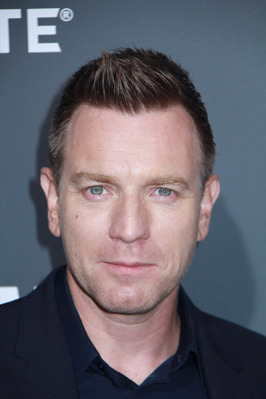
Who doesn’t love Ewan McGregor. Whether he is rock’n the galaxy as Obi-Wan Kenobi in the new installments of the Star Wars series, breaking rules and hearts as Renton in Trainspotting, or taking us on a reminiscent journey as a young Ed Bloom in Big Fish… McGregor has always sucked us into each and every one of his characters because that is what great actors do. Now Ewan has taken on another way to toy with your emotions as he moves behind the camera in his first feature film as a director.
We chat with Ewan about his first directing experience for a short film 17 years ago, fatherhood, the secret to his 20 year marriage, and yes…the possibility of a Trainspotting 2!
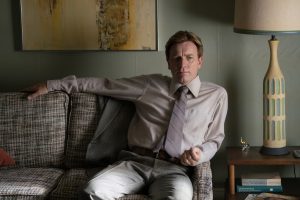 Q: What did you learn from Don Cheadle on Miles Ahead where he was the lead character and the Director?
Q: What did you learn from Don Cheadle on Miles Ahead where he was the lead character and the Director?
The film is very interesting because I didn’t know that I would be making this movie (American Pastoral)when I made Miles Ahead and in that movie I was being directed by my acting partner, Don Cheadle, who was playing Miles Davis, so um, although I didn’t know I was going to be in his shoes if you like, sometime later with American Pastoral, I was still interested in how he was doing it and I found myself, watching very carefully about how he went about it. And the technique he employed to act and direct and then also being given direction by your acting partner is a sort of is an unwritten rule in acting. You would never do that, you don’t tell the other actor what to do. You shouldn’t anyway. But in this case of when you’re directing and acting, of course, it’s your business to. And so I had been on the receiving end of that and I knew how it felt so I was sensitive to the actors that I was working with when I was directing.
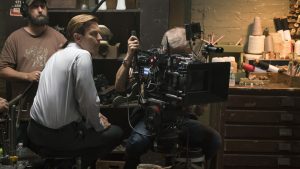 Q: From what I understand, you were the second director attached to this project after Phillip Noyce pulled out. With such a heavy storyline and no directing projects under your belt what made you think “I’m ready” ?
Q: From what I understand, you were the second director attached to this project after Phillip Noyce pulled out. With such a heavy storyline and no directing projects under your belt what made you think “I’m ready” ?
Well, my wife really was the one who I give credit to because I wanted to direct something, I was doing press in London recently and somebody showed me a clip of me on Chris Evans’ television show TFI Friday, twenty years ago, and it’s just after Trainspotting came out, and in this interview he said, “Where will you be in twenty years’ time?” And arrogantly I said, “I’ll be directing and acting.” And I thought, “Oh God, I was right!” So for twenty years I’ve been trying to find a story. I mean, I’ve been very busy as an actor, and I haven’t had many gaps where I’m just looking for stuff, but I’ve always had in the back of my mind I would like to direct. I’ve always felt like a filmmaker, as an actor I’m interested in what the director’s doing with the camera, what the cinematographer’s doing with the camera, having a sort of wider eye at work that just my own character.
I’ve thought, “You don’t just want to be a director for the sake of directing” So when, the last director of American Pastoral left the project in late 2014, then my wife said to me that I should do it and you should think of directing it. And then I had some discussions with my agent and I spent a day off, I was doing a play, I was doing The Real Thing by Tom Stoppard on Broadway. And, we had Mondays off, so in this Monday morning, I woke up and I made big pot of coffee and I sat with the script and I spent all day really just reading these scenes and trying to be honest with myself, can I see it, can I imagine playing the lead and directing the movie. Do I have the bigger picture in my mind. And by the end of the day I was just so excited about it that I phoned up Tom Rosenberg who’s the head of Lakeshore and suggested myself and very soon after that became the director.
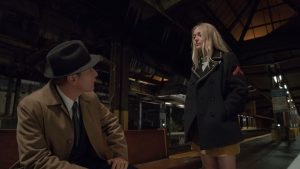 Q: Is there anything you visualized and added to the script?
Q: Is there anything you visualized and added to the script?
One was the last scene of our 14 year old Merry (Ewan’s character’s daughter, played Dakota Fanning) after she’s witnessed one of the Vietnamese monks burning on the television and she’s upset and she comes into her mom and dad’s bedroom at night and she’s floods of tears and she’s saying, “Doesn’t anybody care, has nobody got a conscience?” And she ends up in between her parents in bed in tears as with her parents arms around her and they’re looking at each other over her head. And it’s a beautiful family image if you like, and then the next, the very next scene is Merry now when she’s 16, now it’s Dakota Fanning playing Merry and she’s raging, she’s angry, and she’s politicized and she’s nasty to her mother and these two scenes were back to back and I always liked that in the script. There’s three years between those two scenes, but they’re just, there’s nothing between them in the film and when we played it that way, it was very interesting and it worked very well except when we showed it to some people I felt like it was a hard place for Dakota’s Merry to start because people didn’t warm to her because they, or didn’t understand her or just the very nature of seeing this beautiful girl that we know now screaming and swearing at her parents. They’re like, “Wait a minute, who?” And so what we did is we made a tiny Vietnam War montage of four shots, one is an American bomber dropping bombs, the second shot is napalm hitting the floor, the third shot is an American soldier carrying a dead Vietnamese boy, and the fourth shot is a little Vietnamese boy crying into the air. And we put those four shots between the two scenes that I describe and it suddenly informed everyone about Merry and who she is now and what she, why she’s angry, and what she’s fighting for.
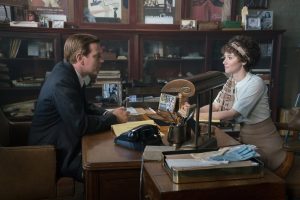 Q: At Toronto International Film Festival, you said you wouldn’t direct again. Is that true?
Q: At Toronto International Film Festival, you said you wouldn’t direct again. Is that true?
Oh no no no, I will. But I don’t think it could immediately because it took me 20 years to find this story and I really do want to do it again, absolutely, because I loved it so much and I’m so proud of it. I look at the film and I think that’s the film that I wanted to make, so I’m really proud of it, but I just feel like I’ve got to wait for the next story and I’ve got to think about, my feeling about doing another film now is that it should be very different.
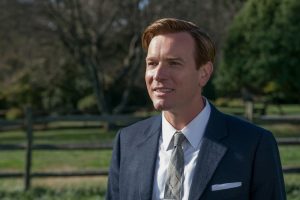 Q: It’s been 20 years since Trainspotting. What’s it like getting back together with everyone again?
Q: It’s been 20 years since Trainspotting. What’s it like getting back together with everyone again?
It was amazing to go back, it was just brilliant to be back in Scotland and be back with Ewan Bremner and Bobby (Robert) Carlyle and Jonny Lee Miller and being those characters again was just quite, daunting I would say to begin with. You know, the idea of playing a part you last played 20 years ago, I felt really worried. I was worried. “What if I can’t find him? What if I put on the Adidas track suit and he’s not there any more, you know? What if I can’t get in touch with him?” But I felt like we all felt a bit like that. And I met Ewen Bremner when I arrived at lunch and I told him that and he said, “Don’t worry, I felt the same way and once you get the first scene it’s like coming home.” And it was, it was brilliant to be those people again and of course maybe the best thing of all was to be back on Danny Boyle’s set because I haven’t worked with him in many years and I regret that we didn’t work together all this time. Not because of any particular movie that he made, but just that I loved working with him and I felt like, you know, I felt like his actor in the early days, it was just brilliant to be back on his set again.
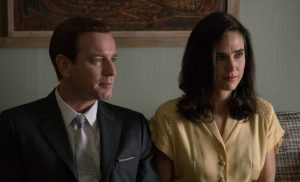 Q: You have been married for 20 years, what’s the secret to having a happy marriage?
Q: You have been married for 20 years, what’s the secret to having a happy marriage?
I don’t have any secrets. I don’t think there can be one, you know. I mean, the answer really is if you want you should marry my wife and then you’d want to stay with her for the rest of your life then you’d be happy. That’s all I can say really, I don’t think there really is any secret, I don’t know.
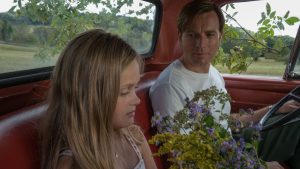 Q: Is being a father difficult for you?
Q: Is being a father difficult for you?
No, being a father is the best thing in the world you know, the most important thing in your life is your children, if you have them. I don’t think that children are the most important thing in life if you don’t have children. I don’t see that one path is better than the other at all, but I think that when you do have children, they’re your everything, you know. And there’s nothing hard about that of course, because it’s the most fulfilling thing in the world really to see them grow up and become adult. You know my eldest is 20, I’ve seen her become an adult now and she’s a nice person, I like her.
American Pastoral opens with a limited release on Oct. 21st and nationwide on 28th
Interview by: Izumi Hasegawa @HNW_Izumi
Edited by: Jody Taylor – @RealJodyTaylor
Follow Us: What’s Up Hollywood at @WhatsUpHWood
